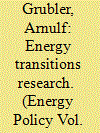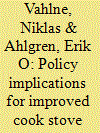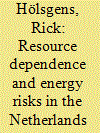|
|
|
Sort Order |
|
|
|
Items / Page
|
|
|
|
|
|
|
| Srl | Item |
| 1 |
ID:
180860


|
|
|
|
|
| Summary/Abstract |
This paper explores the history of wind power technologies and the integration of wind energy in the Danish energy system. It does so focusing particularly on historical events, socio-cultural and socio-political changes and priorities that were important on this technological journey. From the first primitive wind turbines in the late 1800s, to the world wars, through the energy- crisis in the 70s, and into the decades of growing environmental awareness and concern, this historical account describes how policy priorities in Denmark gradually translated from the focus on energy diversification, energy efficiency and energy independence to the focus on sustainability and renewable energy resources, with wind energy and wind power technologies at the top of the priority list. Historically, wind power has been - and it still is - popular in Denmark. However, as the modern wind power turbines gradually grew to industrial scale heights, unchallenged support for specific local wind farms could no longer be taken for granted. This paper also touches upon the frequently tacit dilemmas of renewable energy technology planning and deployment, for example issues of environmental justice, wind farm ownership structures, and the role of social psychology for low-carbon energy transition processes. Notably, attention is drawn to the representation biases that may result in the emphasis of wind farm opposition / grievances in the wider wind farm related debates, where resistance to local wind farm projects might derive from minority opposition groups. Insights and lessons learnt from this Danish history of wind power may prove valuable and inspirational for other countries engaging in low-carbon energy transitions.
|
|
|
|
|
|
|
|
|
|
|
|
|
|
|
|
| 2 |
ID:
116689


|
|
|
|
|
| Publication |
2012.
|
| Summary/Abstract |
This short essay first reviews the pioneers of energy transition research both in terms of data as well as theories. Three major insights that have emerged from this nascent research fields are summarized highlighting the importance of energy end-use and services, the lengthy process of transitions, as well as the patterns that characterize successful scale up of technologies and industries that drive historical energy transitions. The essay concludes with cautionary notes also derived from historical experience. In order to trigger a next energy transition policies and innovation efforts need to be persistent and continuous, aligned, as well as balanced. It is argued that current policy frameworks in place invariably do not meet these criteria and need to change in order to successfully trigger a next energy transition towards sustainability.
|
|
|
|
|
|
|
|
|
|
|
|
|
|
|
|
| 3 |
ID:
128011


|
|
|
|
|
| Publication |
2014.
|
| Summary/Abstract |
Despite the long history of cook stove programs, very few have been successful, often only in areas where biomass is purchased or there is a biomass shortage. Several studies have described how rural households generally rely on several different fuels; which fuels are used may depend on various household characteristics such as location and income. This article explores possible consequences of variations in fuel usage for improved cook stove programs and how this may vary between different areas. Reductions of CO2 equivalent emissions and monetary savings are calculated for hypothetical cook stove deployment using data from a rural energy survey in the V?nh Phúc province of northern Vietnam. The results indicate that the areas may respond differently to the various stove options, both in terms of economy and emission reductions. Furthermore, there are large differences in emission reduction calculations when only Kyoto-gases are included and when non-Kyoto greenhouse agents are added. Assumptions regarding household behavior and stove efficiencies have large impacts on the results, indicating a need for further research on how improved cook stoves may influence households' fuel choices.
|
|
|
|
|
|
|
|
|
|
|
|
|
|
|
|
| 4 |
ID:
162975


|
|
|
|
|
| Summary/Abstract |
Even though the Netherlands was well-endowed with domestic resources, but has also been dependent on foreign supplies. From 1850 onward, consumption of imported coal grew quickly. At the turn of the century, politicians became uneasy about this growing dependence. In 1901 the state-owned State Mines were established to exploit domestic coal and production gradually grew. In the interwar period the Netherlands became almost self-sufficient in coal. After WWII, it experienced a fast transition to oil dependence. In 1959 natural gas was discovered in Groningen by Shell and Esso, and the government forced them to join forces with the State Mines in the exploitation. The fast introduction of natural gas diminished the role of coal, but dependence on imported oil remained. The oil crisis triggered a reorientation of the energy policy, with emphasis on diversification in terms of resources and supplier countries. The export of natural gas was reconsidered. Shifts in energy resource consumption in the Netherlands in the past 150 years, were closely related to perceptions of risks. The Dutch government was strongly involved in previous energy transitions and will also have an important role to play in the transition to renewable energy.
|
|
|
|
|
|
|
|
|
|
|
|
|
|
|
|
| 5 |
ID:
163564


|
|
|
|
|
| Summary/Abstract |
n 1900 a Swedish member of parliament argued that Sweden had a Damocles Sword hanging over it due to the country's rapidly growing imports of coal. This energy import dependence has continued to plague Sweden ever since. While coal dominated imports in the first half of the twentieth century, oil and uranium dominated in the second half. This article examines how Swedish public and private actors coped with the country's energy dependence. Several crises prompted such efforts. Coal strikes in the Interwar years and oil embargoes in the 1970s spurred diversification and collaboration with other importing countries. During World War II Sweden built trustful coal relations with Nazi Germany and stockpiled coal. In the post-war era fear of the international oil majors spurred attempts to increase public control over energy imports, and a state-owned company for foreign oil exploration was set up. Moreover, during and after wars and other acute crises Swedish actors intensified their efforts to exploit more of the country's domestic energy resources. However, when the crisis was over it often proved to be cheaper to import energy from abroad. Thus imports have remained high and the Damocles Sword is still hanging over Sweden.
|
|
|
|
|
|
|
|
|
|
|
|
|
|
|
|
| 6 |
ID:
125703


|
|
|
|
|
| Publication |
2013.
|
| Summary/Abstract |
When investigating the success or failure of different wind power projects, it is essential to take into account how they were historically situated. This study focuses on attempts to develop wind power in an archipelago setting, at Utö in Sweden. It has been argued that the development of Swedish wind power slowed during the 1990s; by revisiting the early days of wind power, looking at resistance and support, and connecting success factors, this can be further investigated.
Whereas earlier research pointed out institutional conditions and site-specific conditions as crucial for successful wind power development and acceptance, the picture can be made more complete by discussing how wind power projects are affected by time-specific historical conditions. In the case of Utö, these can partly be associated with a newly launched political support program that gave the project political legitimacy and added a "pioneering spirit" to the endeavor. Conversely, when wind power is not seen as "pioneering" or "experimental" any more, but as a mere industrial activity, other incentives may need to be offered to municipalities.
|
|
|
|
|
|
|
|
|
|
|
|
|
|
|
|
|
|
|
|
|